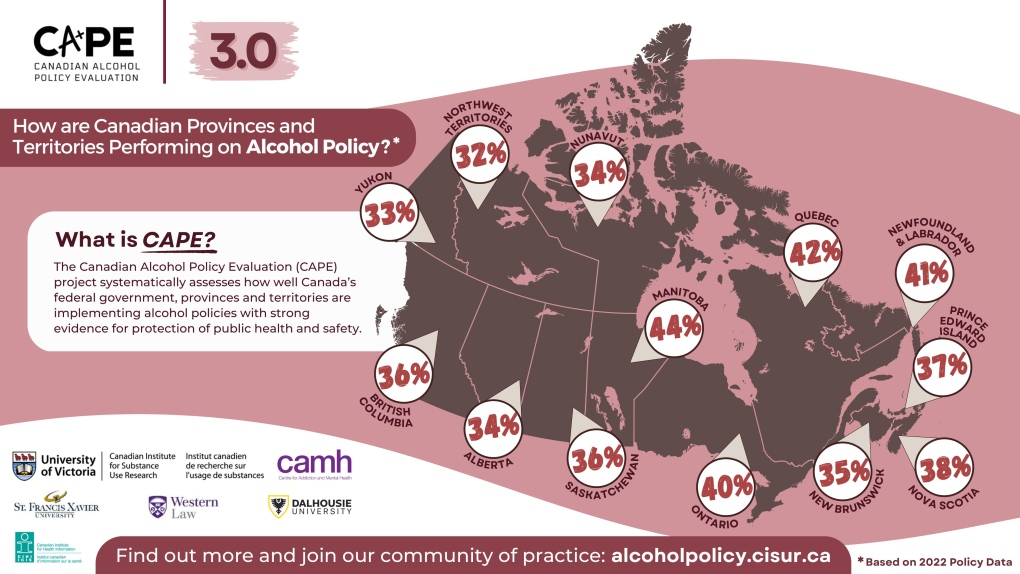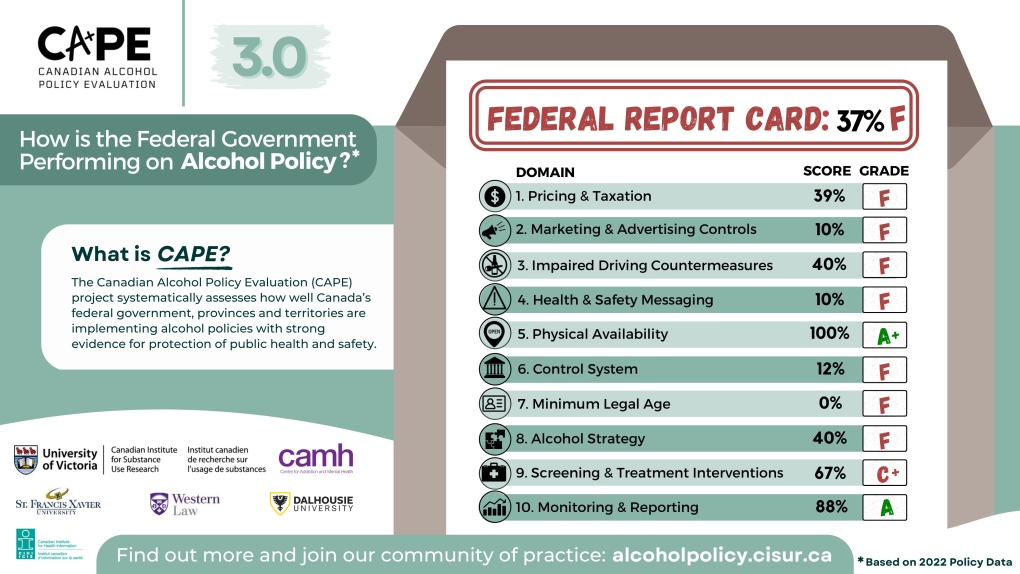All ten provinces and three territories received a failing grade on meeting public health standards for alcohol policies, according to a research project evaluating suggested Canadian alcohol guidelines.
The report by the Canadian Alcohol Policy Evaluation project (CAPE) and led by the University of Victoria's Canadian Institute for Substance Use Research (CISUR) found that provincial and federal governments can still do more to reduce harm from alcohol use in Canada.
Researchers evaluated alcohol policies on a federal and provincial level and evaluated each province and territory based on eleven categories such as pricing, taxation, and health and safety messaging, among others.
According to the CAPE report card, not one jurisdiction received a passing grade.
The Northwest Territories scored the lowest with 32 per cent, while the highest scoring region was Manitoba at just 44 per cent. The federal government was also evaluated on how well its implemented recommendations at the federal level and received a score of 37 per cent.
Alcohol consumption between the highest- and lowest-scoring regions were drastic, as the Northwest Territories reported 786 standard drinks per person aged 15 and over per year, while Manitoba reported 469 on average. According to the Canadian Centre on Substance Use and Addiction (CCSA), a standard drink is a 12-ounce bottle of five per cent alcohol beer or cider, a 5-ounce glass of 12 per cent alcohol wine, or a 1.5-ounce shot glass of 40 per cent alcohol spirits.
On a national scale, there were a reported 802,023 hospital visits related to alcohol reported in 2020, and 17,098 deaths.
 Canadian Alcohol Policy Evaluation project.
Canadian Alcohol Policy Evaluation project.
HARM REDUCTION RECOMMENDATIONS
Canada's Guidance on Alcohol and Health recently caused debate with its new recommendations, which warned while no alcohol is safe to consume, adults shouldn't be drinking any more than two standard drinks per week.
The newly updated recommendations announced this year were a drastic change from the previous recommendations of no more than 15 drinks for men per week and 10 drinks for women -- recommendations that hadn't been changed for the last decade.
The CAPE's recommendations however are not focused on setting a cap on individual's drinking but rather implementing regulations that will reduce harm from alcohol through taxing, marketing and updating criminal penalties.
"This is about more than asking individuals to consider cutting down on their drinking. Yes, that can be important, but governments need to make changes to the broader drinking environment," said lead researcher Dr. Tim Naimi in a news release.
Among the areas that need work, CAPE recommends the federal government increase federal sales taxes on alcohol and update the CRTC code to regulate marketing content from the alcohol industry since there are currently no mandatory examinations of alcohol ads from a third-party authority.
Additionally, the CAPE recommended updates to the criminal code to make it a criminal offence to drive with a blood alcohol concentration (BAC) of more than 0.05 per cent. Currently the limit is 0.08 per cent or more, although some provinces issue non-criminal penalties for drivers with BAC levels of between 0.05 and 0.79, known as the “warn” range.
 Canadian Alcohol Policy Evaluation project.
Canadian Alcohol Policy Evaluation project.











































